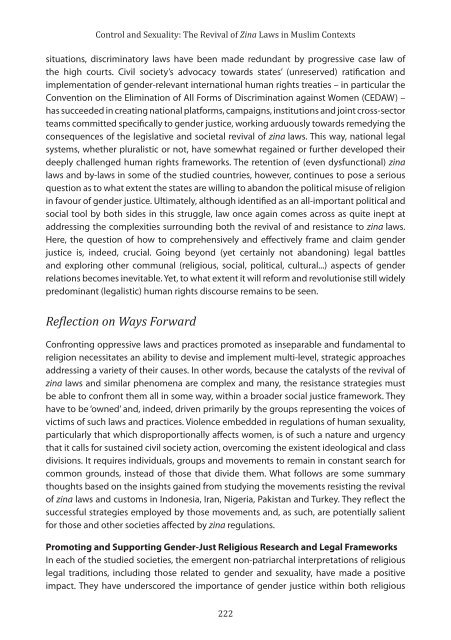control and sexuality
control and sexuality
control and sexuality
- No tags were found...
You also want an ePaper? Increase the reach of your titles
YUMPU automatically turns print PDFs into web optimized ePapers that Google loves.
Control <strong>and</strong> Sexuality: The Revival of Zina Laws in Muslim Contextssituations, discriminatory laws have been made redundant by progressive case law ofthe high courts. Civil society’s advocacy towards states’ (unreserved) ratification <strong>and</strong>implementation of gender-relevant international human rights treaties – in particular theConvention on the Elimination of All Forms of Discrimination against Women (CEDAW) –has succeeded in creating national platforms, campaigns, institutions <strong>and</strong> joint cross-sectorteams committed specifically to gender justice, working arduously towards remedying theconsequences of the legislative <strong>and</strong> societal revival of zina laws. This way, national legalsystems, whether pluralistic or not, have somewhat regained or further developed theirdeeply challenged human rights frameworks. The retention of (even dysfunctional) zinalaws <strong>and</strong> by-laws in some of the studied countries, however, continues to pose a seriousquestion as to what extent the states are willing to ab<strong>and</strong>on the political misuse of religionin favour of gender justice. Ultimately, although identified as an all-important political <strong>and</strong>social tool by both sides in this struggle, law once again comes across as quite inept ataddressing the complexities surrounding both the revival of <strong>and</strong> resistance to zina laws.Here, the question of how to comprehensively <strong>and</strong> effectively frame <strong>and</strong> claim genderjustice is, indeed, crucial. Going beyond (yet certainly not ab<strong>and</strong>oning) legal battles<strong>and</strong> exploring other communal (religious, social, political, cultural...) aspects of genderrelations becomes inevitable. Yet, to what extent it will reform <strong>and</strong> revolutionise still widelypredominant (legalistic) human rights discourse remains to be seen.Reflection on Ways ForwardConfronting oppressive laws <strong>and</strong> practices promoted as inseparable <strong>and</strong> fundamental toreligion necessitates an ability to devise <strong>and</strong> implement multi-level, strategic approachesaddressing a variety of their causes. In other words, because the catalysts of the revival ofzina laws <strong>and</strong> similar phenomena are complex <strong>and</strong> many, the resistance strategies mustbe able to confront them all in some way, within a broader social justice framework. Theyhave to be ‘owned’ <strong>and</strong>, indeed, driven primarily by the groups representing the voices ofvictims of such laws <strong>and</strong> practices. Violence embedded in regulations of human <strong>sexuality</strong>,particularly that which disproportionally affects women, is of such a nature <strong>and</strong> urgencythat it calls for sustained civil society action, overcoming the existent ideological <strong>and</strong> classdivisions. It requires individuals, groups <strong>and</strong> movements to remain in constant search forcommon grounds, instead of those that divide them. What follows are some summarythoughts based on the insights gained from studying the movements resisting the revivalof zina laws <strong>and</strong> customs in Indonesia, Iran, Nigeria, Pakistan <strong>and</strong> Turkey. They reflect thesuccessful strategies employed by those movements <strong>and</strong>, as such, are potentially salientfor those <strong>and</strong> other societies affected by zina regulations.Promoting <strong>and</strong> Supporting Gender-Just Religious Research <strong>and</strong> Legal FrameworksIn each of the studied societies, the emergent non-patriarchal interpretations of religiouslegal traditions, including those related to gender <strong>and</strong> <strong>sexuality</strong>, have made a positiveimpact. They have underscored the importance of gender justice within both religious222


